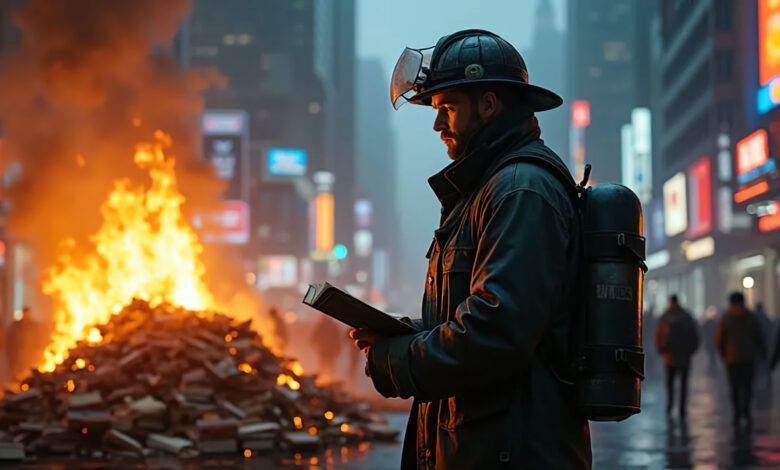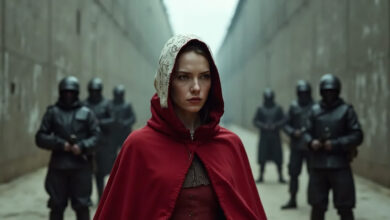
Author: Ray Bradbury
Published: 1953
Genre: Dystopian Fiction / Science Fiction / Cautionary Tale
Setting: A near-future American society where books are outlawed and critical thinking is suppressed
⭐ Why It Matters
Fahrenheit 451 is a powerful defence of freedom of thought, intellectual curiosity, and the danger of censorship. Written during the McCarthy era, it remains relevant in today’s debates over misinformation, screen addiction, and the erosion of truth. It’s widely taught in schools and frequently discussed in book clubs.
👥 Main Characters
- Guy Montag – A fireman whose job is to burn books. At first obedient, he begins to question everything.
- Clarisse McClellan – A curious, free-thinking teenager who opens Montag’s mind to a different way of seeing the world.
- Mildred Montag – Montag’s wife, emotionally distant and addicted to entertainment.
- Captain Beatty – Montag’s boss and intellectual adversary. He defends the censorship regime with sinister eloquence.
- Faber – A former English professor who helps Montag understand the power of books and resistance.
- Granger – Leader of a group of rebels who memorise books to preserve them for the future.
📚 Plot Summary
🔹 A Fireman’s Awakening
In a future where books are banned, firemen burn them.
Guy Montag is one of them — until he meets Clarisse, a young girl who asks him simple, disarming questions like:
“Are you happy?”
Her death (or disappearance) and a series of unsettling events spark Montag’s crisis of conscience.
🔹 A Society of Noise and Numbness
Montag’s wife, Mildred, lives in a medicated haze, obsessed with wall-sized screens and hollow entertainment.
Montag begins secretly reading books he was meant to destroy, searching for truth and meaning.
He turns to Faber, a former academic, who warns him of the risks — but helps him think.
🔹 Rebellion and Escape
Montag’s growing rebellion draws attention. Captain Beatty, suspecting him, challenges him with contradictions from literature — then forces him to burn his own house.
Montag turns the flamethrower on Beatty, kills him, and flees the city. He joins a group of renegade “book people” who preserve knowledge by memorising entire texts.
🔹 A World in Ashes, A Hope in Memory
As bombs fall and civilisation collapses, Montag and the others prepare to rebuild society, keeping books alive in minds, not pages.
The novel ends with a quiet but powerful sense of rebirth through memory, knowledge, and human connection.
🧠 Themes & Takeaways
- Censorship & Control – Banning books isn’t just about fear — it’s about silencing dissent and promoting ignorance.
- Conformity vs Curiosity – Society is numbed by comfort and entertainment; only a few dare to question.
- The Power of Books – Literature isn’t just words — it’s thought, empathy, danger, and freedom.
- Technology and Distraction – The novel eerily anticipates screen culture, noise, and media saturation.
- Rebellion & Renewal – Montag’s journey is one of awakening, destruction, and hope.





